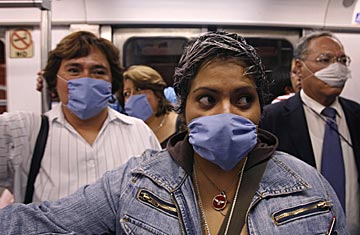
Subway riders in Mexico City wear surgical masks to avoid catching the flu, Friday, April 24.
(4 of 4)
5. So how scared should we be?
That depends on whom you ask. Officials at the CDC and the WHO have emphasized that while the swine flu situation is serious, they're responding with an abundance of precautions. Even Osterholm, who has been highly critical of the U.S. government's long-term failures to better prepare for a pandemic, gives the CDC a 9 out of 10 for its response so far. Outside of Mexico, the swine flu hasn't looked too serious yet — unlike during the SARS outbreaks of 2003, when an entirely new virus with no obvious treatment took the world by surprise. In the U.S., the normal flu season is winding down, which should make it easier for public-health officials to pick out swine flu cases from run-of-the-mill respiratory disease. And there are simple things that people can do to protect themselves, like practicing better hygiene (wash hands frequently and cover mouth and nose when sneezing) and staying away from public places or traveling if they feel sick. "There's a role for everyone to play when an outbreak is ongoing," said Besser.
But the truth is that every outbreak is unpredictable, and there's a lot we don't know yet about the new swine flu. There hasn't been a flu pandemic for more than a generation, and there hasn't been a truly virulent pandemic since long before the arrival of mass air transit. We're in terra incognito here. Panic would be counterproductive — especially if it results in knee-jerk reactions like closing international borders, which would only complicate the public-health response. But neither should we downplay our very real vulnerabilities. As Napolitano put it: "This will be a marathon, not a sprint." Be prepared.
See TIME's pictures of the week.
See the world's most influential people in the 2009 TIME 100.
